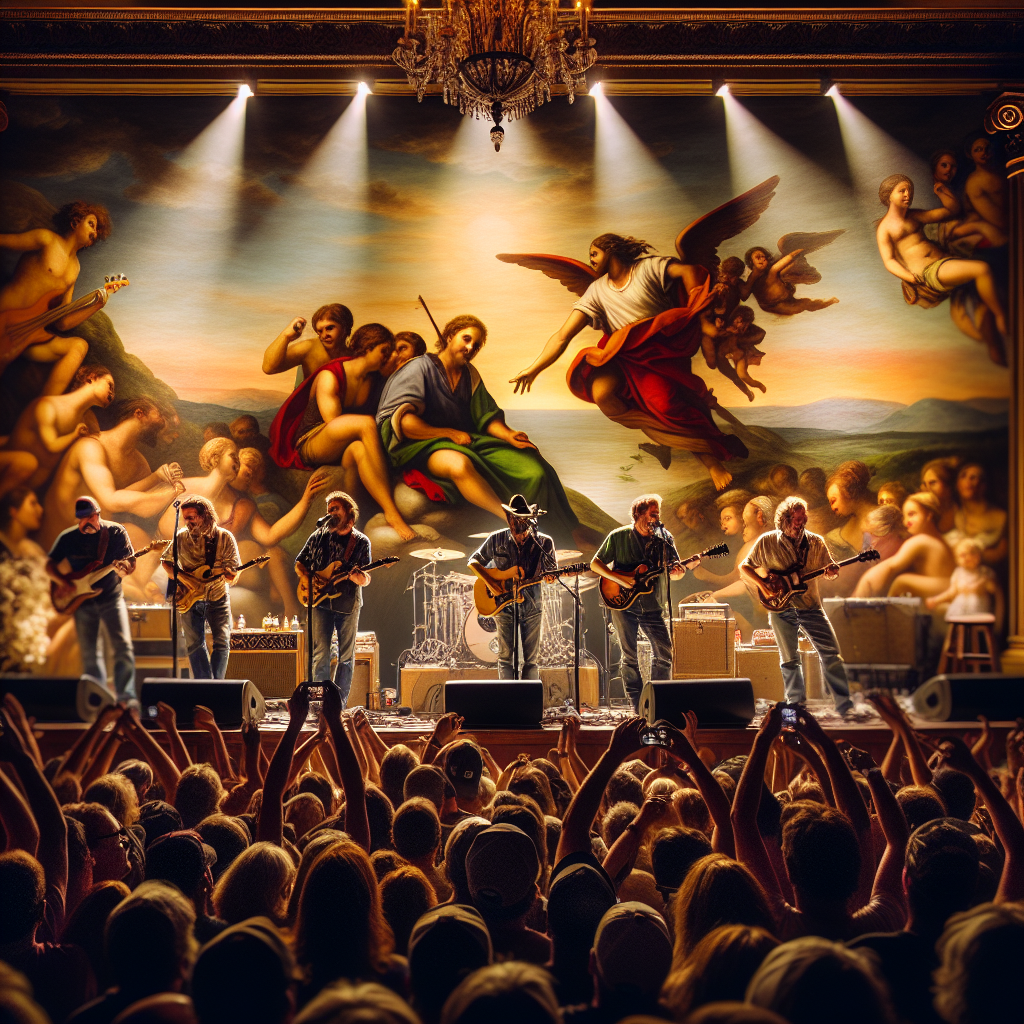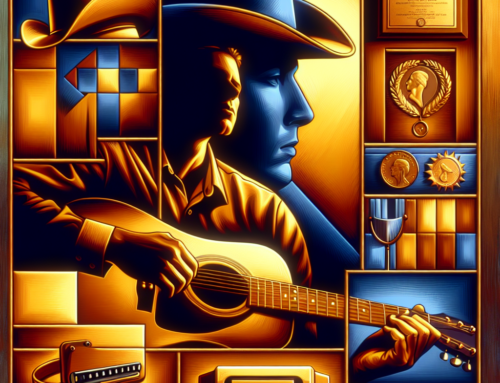-
Table of Contents
- Introduction
- The Evolution Of Southern Rock: From The 70s To Today
- Iconic Southern Rock Bands And Their Influence On Modern Music
- Southern Rock Revival: Key Albums You Need To Hear
- The Role Of Southern Culture In Shaping Southern Rock
- Southern Rock Festivals: Celebrating The Genre’s Legacy
- The Future Of Southern Rock: Emerging Artists To Watch
- Q&A
- Conclusion
“Reviving the Spirit of the South: Classic Southern Rock Reimagined”
Introduction
The Southern Rock Revival, often referred to as Classic Southern Rock, emerged in the late 1960s and 1970s as a powerful and distinct genre that blended the raw energy of rock and roll with the rich musical traditions of the American South. Characterized by its gritty guitar riffs, soulful vocals, and a fusion of blues, country, and rock influences, Southern Rock became a defining sound of the era. Bands like Lynyrd Skynyrd, The Allman Brothers Band, and ZZ Top led the charge, crafting anthems that celebrated Southern pride, freedom, and the complexities of life below the Mason-Dixon line. With its roots deeply embedded in the cultural and musical heritage of the South, the Southern Rock Revival not only captivated audiences with its electrifying performances but also left an indelible mark on the landscape of American music.
The Evolution Of Southern Rock: From The 70s To Today
The Southern rock genre, which emerged in the late 1960s and gained prominence in the 1970s, has experienced a fascinating evolution over the decades. Initially characterized by its blend of rock, country, and blues, Southern rock became a defining sound of American music, with bands like Lynyrd Skynyrd, The Allman Brothers Band, and ZZ Top leading the charge. These groups not only captured the spirit of the American South but also resonated with audiences nationwide, creating a legacy that continues to influence musicians today.
In the 1970s, Southern rock was marked by its raw energy and authenticity. Bands often incorporated extended guitar solos, dual lead guitars, and a rhythm section that drew heavily from blues and country traditions. The lyrics frequently celebrated Southern culture, touching on themes of freedom, rebellion, and regional pride. This era of Southern rock was not just about the music; it was a cultural movement that reflected the social and political climate of the time. As the genre gained popularity, it became synonymous with a certain rugged individualism and a celebration of Southern identity.
As the 1980s approached, the Southern rock scene began to shift. The tragic plane crash that claimed the lives of several members of Lynyrd Skynyrd in 1977 marked a turning point for the genre. While some bands continued to thrive, others struggled to maintain their momentum. The rise of new musical styles, such as punk and new wave, also contributed to Southern rock’s decline in mainstream popularity. However, this period was not without its innovations. Bands like .38 Special and The Outlaws adapted by incorporating more polished production techniques and exploring new lyrical themes, ensuring that Southern rock remained relevant.
The 1990s and early 2000s saw a resurgence of interest in Southern rock, as a new generation of musicians began to draw inspiration from the classic sounds of the 1970s. This revival was characterized by a return to the genre’s roots, with artists emphasizing the traditional elements that had originally defined Southern rock. Bands like The Black Crowes and Gov’t Mule emerged, blending the classic Southern rock sound with contemporary influences. This period also saw the rise of the jam band scene, which embraced the improvisational aspects of Southern rock and introduced them to a new audience.
In recent years, Southern rock has continued to evolve, with artists exploring new directions while remaining true to the genre’s core elements. The rise of Americana and alt-country has provided a fertile ground for Southern rock’s continued growth, as musicians blend traditional sounds with modern sensibilities. Bands like Drive-By Truckers and Blackberry Smoke have successfully navigated this landscape, creating music that honors the past while pushing the boundaries of the genre.
The Southern rock revival is a testament to the enduring appeal of this uniquely American sound. As the genre continues to evolve, it remains a powerful force in the music world, inspiring new generations of musicians and fans alike. By embracing its rich history while remaining open to innovation, Southern rock has secured its place as a vital and dynamic part of the musical landscape. As we look to the future, it is clear that Southern rock will continue to thrive, adapting to new cultural and musical contexts while staying true to its roots.
Iconic Southern Rock Bands And Their Influence On Modern Music
The Southern rock genre, with its roots deeply embedded in the American South, has long been a significant force in the music industry. Emerging in the late 1960s and gaining prominence throughout the 1970s, Southern rock is characterized by its fusion of rock and roll, country, and blues, creating a distinctive sound that resonates with authenticity and raw energy. Iconic bands such as Lynyrd Skynyrd, The Allman Brothers Band, and ZZ Top have not only defined the genre but have also left an indelible mark on modern music, influencing countless artists across various genres.
Lynyrd Skynyrd, perhaps the most emblematic of Southern rock bands, brought the genre to the forefront with their anthemic hits like “Sweet Home Alabama” and “Free Bird.” Their music, steeped in Southern pride and storytelling, captured the spirit of the South and resonated with audiences nationwide. The band’s intricate guitar work and powerful lyrics set a standard for Southern rock, inspiring a generation of musicians to explore similar themes and sounds. As a result, Lynyrd Skynyrd’s influence can be seen in the works of contemporary rock and country artists who seek to emulate their blend of narrative depth and musical prowess.
Similarly, The Allman Brothers Band played a pivotal role in shaping Southern rock’s identity. Known for their improvisational style and blues-infused rock, they introduced a level of musicianship that elevated the genre. Their live performances, often featuring extended jams, showcased their technical skill and creativity, setting a precedent for live rock performances. The Allman Brothers Band’s emphasis on musical exploration and innovation has inspired modern jam bands and rock artists to push the boundaries of their own music, blending genres and experimenting with new sounds.
ZZ Top, with their unique blend of Southern rock, blues, and boogie, brought a different flavor to the genre. Their catchy riffs and charismatic stage presence made them a staple in the rock scene. ZZ Top’s ability to craft memorable hooks and their embrace of visual elements in their performances have influenced modern rock bands that prioritize both musical and visual artistry. The band’s success in maintaining relevance over decades serves as a testament to the enduring appeal of Southern rock’s core elements.
Transitioning to the present, the legacy of these iconic Southern rock bands is evident in the music of contemporary artists who draw inspiration from their predecessors. Bands like Kings of Leon and The Black Keys have incorporated elements of Southern rock into their music, blending it with modern rock and alternative influences. This fusion has resulted in a resurgence of interest in Southern rock, as new generations discover the genre’s rich history and dynamic sound.
Moreover, the influence of Southern rock extends beyond the rock genre itself. Country music, particularly the subgenre of country rock, has embraced the storytelling and musical style pioneered by Southern rock bands. Artists such as Chris Stapleton and Zac Brown Band have successfully integrated Southern rock elements into their music, creating a hybrid sound that appeals to a broad audience.
In conclusion, the impact of iconic Southern rock bands on modern music is both profound and far-reaching. Their contributions have not only defined a genre but have also inspired a diverse array of artists to explore and expand upon their musical legacy. As Southern rock continues to evolve, its foundational elements remain a source of inspiration, ensuring that the genre’s spirit endures in the ever-changing landscape of modern music.
Southern Rock Revival: Key Albums You Need To Hear

The Southern rock revival has been a fascinating phenomenon in the music world, breathing new life into a genre that once dominated the airwaves in the 1970s. This resurgence is not merely a nostalgic nod to the past but a reimagining of the classic Southern rock sound, blending traditional elements with modern influences. To truly appreciate this revival, it is essential to explore some key albums that have played a pivotal role in shaping the contemporary Southern rock landscape.
One cannot discuss Southern rock without acknowledging the profound impact of the Allman Brothers Band. Their seminal album, “At Fillmore East,” remains a cornerstone of the genre, showcasing the band’s virtuosic musicianship and improvisational prowess. This live album captures the raw energy and intricate interplay between Duane Allman’s slide guitar and Dickey Betts’ melodic leads, setting a high bar for future Southern rock musicians. The influence of this album is evident in the works of many revival bands, who strive to emulate its blend of blues, jazz, and rock.
Transitioning from the Allman Brothers, Lynyrd Skynyrd’s “Pronounced ‘Lĕh-‘nérd ‘Skin-‘nérd” is another quintessential album that has left an indelible mark on Southern rock. With its anthemic tracks like “Free Bird” and “Simple Man,” this album encapsulates the spirit of Southern rock with its storytelling lyrics and powerful guitar riffs. The band’s ability to craft songs that resonate with themes of freedom and resilience continues to inspire contemporary artists who seek to capture the essence of the Southern experience.
As the Southern rock revival gained momentum, newer bands began to emerge, drawing inspiration from these classic albums while infusing their own unique styles. The Drive-By Truckers, for instance, have been instrumental in redefining the genre with albums like “Southern Rock Opera.” This ambitious double album weaves a narrative that explores the complexities of Southern identity, blending rock, country, and punk influences. The band’s storytelling prowess and willingness to tackle challenging themes have earned them a dedicated following and solidified their place in the Southern rock revival.
Similarly, the Tedeschi Trucks Band has made significant contributions to the genre with albums such as “Revelator.” Led by the husband-and-wife duo of Derek Trucks and Susan Tedeschi, the band combines elements of blues, soul, and rock to create a sound that is both contemporary and deeply rooted in tradition. Their ability to seamlessly blend genres and deliver powerful live performances has garnered critical acclaim and expanded the boundaries of Southern rock.
In addition to these bands, the revival has seen the rise of artists like Jason Isbell, whose album “Southeastern” has been hailed as a masterpiece of modern Southern songwriting. Isbell’s introspective lyrics and emotive storytelling resonate with listeners, offering a fresh perspective on the Southern experience. His work exemplifies the evolution of Southern rock, demonstrating that the genre can be both reflective and forward-thinking.
In conclusion, the Southern rock revival is a testament to the enduring appeal of a genre that continues to evolve while honoring its roots. By exploring key albums from both classic and contemporary artists, listeners can gain a deeper understanding of the rich tapestry that defines Southern rock today. As the revival progresses, it promises to introduce new voices and sounds, ensuring that Southern rock remains a vibrant and dynamic force in the music world.
The Role Of Southern Culture In Shaping Southern Rock
Southern rock, a genre that emerged in the late 1960s and gained prominence in the 1970s, is deeply rooted in the cultural fabric of the American South. This musical style, characterized by its blend of rock and roll, country, and blues, reflects the diverse cultural influences of the region. To understand the role of Southern culture in shaping southern rock, it is essential to explore the historical and social contexts that gave rise to this distinctive sound.
The American South, with its complex history of colonization, slavery, and civil rights struggles, has long been a melting pot of cultural influences. This rich tapestry of experiences is reflected in the music of the region, which has always been a means of expression and storytelling. Southern rock artists drew inspiration from the blues, a genre that originated in the African American communities of the South. The blues’ emotive storytelling and raw, soulful sound provided a foundation upon which southern rock was built. Additionally, the influence of country music, with its roots in the folk traditions of the rural South, contributed to the narrative-driven and melodic elements of southern rock.
Moreover, the Southern identity, with its emphasis on regional pride and a sense of place, played a crucial role in shaping the themes and aesthetics of southern rock. The genre often celebrates the Southern way of life, with lyrics that evoke images of small towns, open roads, and the natural beauty of the region. This connection to place is further reinforced by the use of traditional Southern instruments, such as the slide guitar and harmonica, which lend an authentic sound to the music.
In addition to musical influences, the social and political climate of the South during the 1960s and 1970s also impacted the development of southern rock. The civil rights movement and the counterculture of the era challenged traditional norms and inspired a spirit of rebellion and change. Southern rock artists, while often embracing their regional identity, also sought to address broader social issues through their music. This duality is evident in the work of bands like Lynyrd Skynyrd and The Allman Brothers Band, who combined Southern pride with a progressive outlook.
Furthermore, the communal aspect of Southern culture, with its emphasis on hospitality and storytelling, is mirrored in the collaborative nature of southern rock bands. These groups often functioned as tight-knit communities, with members contributing to the songwriting and performance process. This sense of camaraderie and shared purpose is a hallmark of the genre, fostering a spirit of creativity and innovation.
As southern rock continues to evolve, it remains a testament to the enduring influence of Southern culture. Contemporary artists draw upon the rich legacy of the genre while infusing it with modern sensibilities, ensuring that southern rock remains relevant and vibrant. The genre’s ability to adapt and resonate with new generations speaks to the timeless appeal of its cultural roots.
In conclusion, the role of Southern culture in shaping southern rock is multifaceted, encompassing musical influences, regional identity, social and political contexts, and communal values. This intricate interplay of factors has given rise to a genre that is both deeply rooted in tradition and continually evolving. As southern rock experiences a revival, it serves as a powerful reminder of the enduring impact of Southern culture on the musical landscape.
Southern Rock Festivals: Celebrating The Genre’s Legacy
The resurgence of Southern rock in recent years has sparked a renewed interest in the genre, leading to the establishment of numerous festivals dedicated to celebrating its rich legacy. These festivals serve as a testament to the enduring appeal of Southern rock, a genre that seamlessly blends elements of rock, blues, and country music. As fans gather to revel in the sounds that defined a generation, these events also provide a platform for both legendary acts and emerging artists to showcase their talents, ensuring the genre’s continued evolution.
Southern rock festivals are more than just musical gatherings; they are cultural celebrations that honor the genre’s roots and its impact on American music history. By bringing together diverse audiences, these festivals create a sense of community among fans who share a deep appreciation for the genre’s distinctive sound. This communal atmosphere is further enhanced by the festivals’ settings, often held in locations that reflect the Southern heritage, such as sprawling fields or historic venues. These environments not only provide a backdrop for the music but also evoke a sense of nostalgia, transporting attendees back to the era when Southern rock first captured the hearts of listeners.
Moreover, the lineup of artists at these festivals often includes a mix of iconic bands and new talent, illustrating the genre’s dynamic nature. Legendary groups like Lynyrd Skynyrd and The Allman Brothers Band have paved the way for contemporary acts, who are now taking the stage to carry the torch forward. This intergenerational exchange is crucial for the genre’s survival, as it allows for the blending of traditional sounds with modern influences, thereby attracting a broader audience. As a result, Southern rock festivals not only celebrate the past but also embrace the future, fostering an environment where innovation and tradition coexist harmoniously.
In addition to the music, these festivals often feature a variety of activities that further immerse attendees in the Southern rock experience. From workshops and panel discussions to art exhibits and food vendors, the festivals offer a holistic approach to celebrating the genre. These activities provide fans with opportunities to engage with the music on a deeper level, whether by learning about the history of Southern rock or by sampling regional cuisine that complements the festival’s Southern theme. This multifaceted approach ensures that attendees leave with a greater appreciation for the genre and its cultural significance.
Furthermore, Southern rock festivals play a vital role in supporting the local economy and promoting tourism in the regions where they are held. By attracting visitors from across the country and even internationally, these events generate significant revenue for local businesses, from hotels and restaurants to shops and transportation services. This economic impact underscores the importance of Southern rock festivals not only as cultural events but also as drivers of economic growth and community development.
In conclusion, Southern rock festivals are a celebration of the genre’s legacy, offering a unique blend of music, culture, and community. By honoring the past while embracing the future, these festivals ensure that Southern rock remains a vibrant and relevant force in the music world. As fans continue to flock to these events, they contribute to the genre’s ongoing revival, ensuring that the spirit of Southern rock will endure for generations to come.
The Future Of Southern Rock: Emerging Artists To Watch
The Southern rock genre, with its roots deeply embedded in the rich musical traditions of the American South, has experienced a resurgence in recent years. This revival is not merely a nostalgic nod to the past but a dynamic evolution that embraces both the classic elements of Southern rock and the innovative spirit of contemporary music. As we look to the future of Southern rock, it is essential to recognize the emerging artists who are redefining the genre while paying homage to its storied history.
One of the most intriguing aspects of this Southern rock revival is the way new artists are blending traditional sounds with modern influences. This fusion creates a fresh yet familiar sound that resonates with both longtime fans and new listeners. For instance, bands like Blackberry Smoke and The Marcus King Band have successfully captured the essence of classic Southern rock while infusing it with elements of blues, country, and even soul. Their music reflects a deep respect for the genre’s pioneers, such as Lynyrd Skynyrd and The Allman Brothers Band, while also pushing the boundaries to create something uniquely their own.
Moreover, the rise of digital platforms has played a significant role in the resurgence of Southern rock. These platforms have provided emerging artists with unprecedented access to a global audience, allowing them to share their music and connect with fans in ways that were previously unimaginable. This accessibility has not only broadened the reach of Southern rock but has also encouraged a diverse range of artists to experiment with the genre, leading to a more inclusive and varied musical landscape.
In addition to the influence of digital media, the cultural and social climate of the South has also contributed to the evolution of Southern rock. As the region continues to grapple with its complex history and identity, artists are using their music as a means of exploring and expressing these themes. This introspective approach has resulted in lyrics that are both personal and universal, addressing issues such as love, loss, and the search for meaning in an ever-changing world. By tackling these subjects, emerging Southern rock artists are not only preserving the genre’s storytelling tradition but are also ensuring its relevance in today’s society.
Furthermore, the collaborative nature of the music industry today has fostered a sense of community among Southern rock artists. Many musicians are choosing to work together, sharing ideas and influences to create a more cohesive and vibrant scene. This spirit of collaboration is evident in the numerous festivals and events dedicated to Southern rock, where established and emerging artists alike come together to celebrate their shared passion for the genre. These gatherings serve as a testament to the enduring appeal of Southern rock and its ability to bring people together through the power of music.
As we consider the future of Southern rock, it is clear that the genre is in capable hands. The emerging artists of today are not only preserving the legacy of Southern rock but are also breathing new life into it, ensuring its continued evolution and relevance. By embracing both tradition and innovation, these musicians are paving the way for a new era of Southern rock that honors its past while boldly stepping into the future. In doing so, they are not only keeping the spirit of Southern rock alive but are also inspiring a new generation of fans and musicians to carry the torch forward.
Q&A
1. **What is Southern Rock Revival?**
Southern Rock Revival refers to the resurgence and renewed interest in the Southern rock genre, which blends rock, country, and blues influences, often characterized by its distinctive guitar riffs and Southern cultural themes.
2. **Which bands are associated with the Southern Rock Revival?**
Bands like Lynyrd Skynyrd, The Allman Brothers Band, and ZZ Top are often associated with the Southern Rock Revival, having played pivotal roles in popularizing the genre.
3. **What are some key characteristics of Southern Rock music?**
Southern Rock is known for its use of electric guitar riffs, bluesy melodies, storytelling lyrics, and a blend of rock, country, and blues elements, often reflecting Southern U.S. culture and themes.
4. **When did the Southern Rock Revival primarily occur?**
The Southern Rock Revival primarily occurred in the late 1960s through the 1970s, with a resurgence in popularity in the late 1990s and early 2000s.
5. **What impact did the Southern Rock Revival have on music?**
The Southern Rock Revival brought Southern cultural themes to mainstream rock music, influenced later genres like country rock and Americana, and helped establish iconic bands and musicians.
6. **How did Southern Rock influence other music genres?**
Southern Rock influenced other genres by integrating rock with country and blues, paving the way for country rock, Americana, and influencing artists across various genres with its distinctive sound and storytelling approach.
Conclusion
The Southern Rock Revival, often referred to as Classic Southern Rock, emerged as a powerful musical movement in the late 1960s and 1970s, characterized by its fusion of rock, country, and blues influences. Bands like Lynyrd Skynyrd, The Allman Brothers Band, and ZZ Top became iconic for their distinctive sound, which featured gritty guitar riffs, soulful vocals, and themes rooted in Southern culture and pride. This genre not only celebrated the musical heritage of the American South but also resonated with audiences nationwide, contributing to its enduring popularity. The Southern Rock Revival played a significant role in shaping the rock genre, leaving a lasting legacy that continues to influence musicians and captivate fans today.




